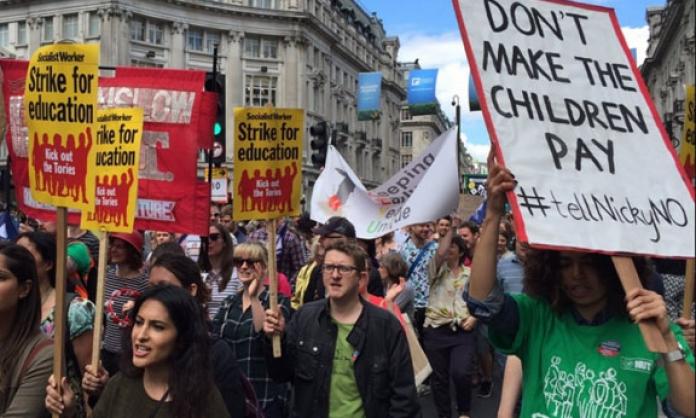Teachers across England went on strike on 5 July against the Conservative government’s education cuts.
Up to 7,000 schools were shut, or partially shut, by the action, called by the National Union of Teachers, as protests and meetings were held across the country. An estimated 10,000 marched in London, through Trafalgar Square to the parliament.
“We struck and rallied today! Was very inspiring”, Jessica, a striking teacher, told Red Flag via email.
An overwhelming majority of teachers voted to strike because the government has frozen funding per student, leaving schools with fewer resources, fewer teaching assistants and larger class sizes. “By the end of next year, it’s looking like 35 students to a class”, said Jessica.
Last year, a research paper published by the Institute for Fiscal Studies forecast that school spending per pupil would likely fall by 8 percent by 2020 under the government’s current funding model.
Teachers are already exhausted – some work 60 hours a week and have more than 30 students to deal with. Nick Wigmore, a Manchester primary school teacher, told the Guardian: “I’m seeing an awful lot of schools facing quite dramatic financial deficits over the next few years and the pressure’s getting much worse now … There’s been more redundancies in the last six months than I’ve seen in the previous five years”.
Speakers from the platform in London also spoke about how standardised testing stifles children’s creativity. The Conservatives want working class kids who can obey instructions and count, but little more. Teachers of music, drama and the arts are facing the sack as school budgets are squeezed.
The strike also had a strong anti-racist message. Before and after Britain’s referendum to leave the European Union, the political atmosphere was turning toxic. Establishment politicians were attempting to take anger about lack of jobs and the strained health and education systems and direct it against immigrants.
The message of the strikers was that immigrants aren’t to blame for under-resourced schools – it’s the government’s fault.
Labour Party MP John McDonnell, shadow chancellor of the exchequer, addressed the crowd. “This campaign will grow. Whether on the picket line or in parliament, we will be with you in solidarity”, he said.










